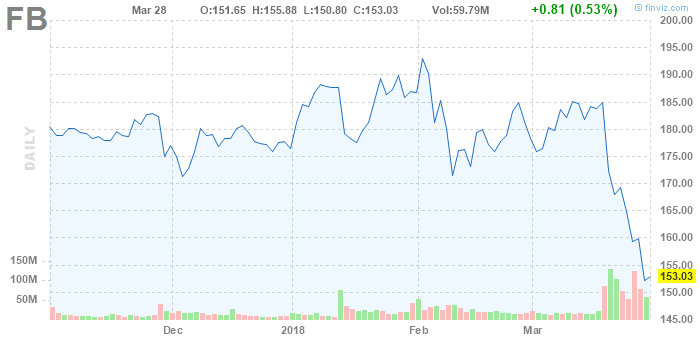Facebook Privacy Issues – A Strong Buy Opportunity – Weekly Investments
Featured Image from © Coloures-Pic @ stock.adobe--Facebook Privacy Issues
Facebook Privacy Issues- FB A Strong Buy Opportunity
Our Weekly Investment of the week is Facebook. These Facebook privacy issues have made FB a strong buy opportunity. Do not let this opportunity pass you by. Read our article, do your research, and come to your own conclusion.

Image above from © finviz.com
Intro – Facebook Privacy Issues
Since the news broke about the company’s Cambridge Analytica data scandal and Facebook privacy issues, Facebook (FB) stock price has recently had its largest decline in nearly four years. Facebook’s tactics have been questioned on multiple occasions in the past. All beginning with its inception in 2004 when Facebook’s founder and now CEO Mark Zuckerberg was accused of stealing the idea of Facebook from his fellow classmates at Harvard. Since its founding, Facebook has been plagued with a range of issues, including political controversy, data mining, inability to terminate accounts, photo recognition, employee-employer relations, child safety, hate speech, and yes, online Facebook privacy issues. These problems have resulted in FB being banned in countries such as China and a temporary pull back of its stock price. Regardless of these temporary corrections, these issues haven’t stopped Facebook from plunging forward and accumulating approximately a 500%+ return over the past five years.
I have yet to read an updated article which focuses on the past Facebook privacy issues. To me it appears that Facebook goes through some form of privacy issue every few years. The privacy issue gets made public, the market overreacts, Facebook apologizes, and within a few months stock prices are back to record highs. Here are some of the privacy issues which Facebook has been scrutinized in the past:
- Around August 2007, the code utilized on Facebook’s homepage was accidentally made public
- In November-December 2009, Facebook launched Beacon, a software which allowed Third-parties to put a script on their website which would send information back to Facebook on what the Facebook users were doing on the third-party website. The FTC brought charges against FB for failing to keep privacy promises.
- Electronic Frontier Foundation identified personal aggregation techniques called “connections” and “instant personalization” – these were both techniques which allowed user information to become public even if the user had no intention of doing so.
- In 2011 Facebook launched “Tag Suggestions” a facial recognition feature which would suggest possible individuals to tag in photos
These are all issues Facebook came under heavy scrutiny for and the market reacted to each of these. There is nothing I can find on this current facebook privacy issues which makes me think that the market has not overreacted again.
Qualitative and Intangibles – Facebook Privacy Issues
Facebook is a strong growing business with high profit margins and little debt. I personally do not like to invest in tech companies as I do not fully understand them. This being said, Facebook obatin’s the following intangibles which have me convinced it is not slowing down anytime soon.
Consumer Loyalty – FB users have their entire past decade posted on FB. Everything from graduation, baby pictures, family trips, birthday wishes from late relatives, etc.. It would be very difficult to transfer all this to a new platform. It is much easier to buy a Samsung instead of an Apple when you go get your next upgrade. Similarly it is much easier to use Bing instead of Google the next time you search something on the web. Both Google (Gmail) and Apple (Itunes) have taken steps to personalize your experience to maintain customer loyalty and make it more difficult to substitute their products. That being said, compare that to Facebook which a user would have to copy down and reload all videos/pictures (losing all tagged friends) and additionally would lose most if not all the comments.
Market Dominance – Facebook dominates the social media market. According to statista.com, in the US alone, FB controlled 78.7% of ad revenues from social networks in 2017.
Brand Recognition – Users know what to expect on FB. Random rants from friends, funny memes and videos, pictures of family trips, local politics and news, etc. When a friend asks you if you know somebody what is the first thing you say? “Does he/she have FB?”
Simplification of Processes – Despite it being a tech company, FB doesn’t have a bunch of moving pieces. I consider Facebook much like buying a newspaper 30 years ago which makes it money from ads but ultimately has free content or a billboard company which approximately 6.5 out of 10 US citizens drive by on their way to work.
Advertiser Loyalty – Even after this Cambridge Analytica data scandal, many analysts are predicting a very minimal impact on FB from advertisers leaving. FB’s consumer base is too large and customer loyalty is to great for advertisers to go elsewhere.
Potential to Expand – Facebook has just scratched the surface of monetizing its platform. Just like its main competitors have displayed (Google with driverless cars and Amazon with Alexa), if a company attains a loyal consumer base, they can easily penetrate into new industries/products. I could very well see Facebook seriously expanding its streaming services, VR, smart devices, and shopping platform in the next decade.
I believe value investors like Warren Buffet do not invest in companies like FB because of the high P/B value (5.97 according to Yahoo Finance) and lack of understanding the business process. I to consider myself a value investor but do not see either of these as large enough inefficiencies to not capitalize upon this opportunity. The business process is not that difficult to understand. The consumer base is already there and the product is already there. Unlike Apple and Microsoft, there isn’t a new software or product that needs to be released every six months.
To me, with a profit margin of 39.2%, a low PEG of 0.86, and according to this article by businessinsider.com, $599k net profit per employee, along side the qualitative aspects mentioned above makes up for the exceedingly high P/B. Yes, I would like to be able to liquidate assets if the company I own goes bankrupt but I also do not plan on investing in a company I think has even the slightest possibility of going bankrupt in the next 10 years.
Quantitative Reasonings – Facebook Privacy Issues
Profit Margin
As stated before a 39.2% profit margin is great. So long as Facebook’s domination of the social media market remains, there is no reason to expect that this will be letting up anytime soon.
Intrinsic Value and Margin of Safety
This is my personal calculation based upon Benjamin Graham’s formula but I have altered it a bit to be more conservative. So Intrinsic Value =(EPS*(7+1*G)*4.4)/4
Data Below is from Finviz.com:
Facebook EPS= $6.16
Growth 5 year avg.= 26.9%
So (6.16*(7+1*26.9)*4.4)/4 = 229.71 Intrinsic Value
Intrinsic Value 229.71
Less: Current Price 153.16
Margin of Safety 76.55
Margin of Safety % 33.3%
As a value investor, I look for at least a 25% margin of safety.
Cash Flow According to CSIMarket.com
According to CSIMarket.com, As of December 31, 2017, FB had a Free Cash Flow of $17.5 billion. This is incredible and illustrates FB is bringing in cash hand over fist.
Return on Equity According to Finviz
Facebook does not pay a dividend so therefore I look for a high ROE. Return on equity is the amount of net income returned as a percent of shareholder equity. This illustrates how effective a company is at utilizing cash put into the company in the form of equity. If the ROE is high, I am not too worried about a company which lacks a dividend. The first reason is that I do not fall prey to double taxation. Lastly, the capital in which the company is holding on to for me is accompanied by a healthy rate of return. According to Finviz.com, FB’s ROE is 23.2%. I strive for a 25% ROE when a company is not paying out a dividend but with all things being considered I understand FB is a fast growing company which needs the capital to fund its continuous growth.
Debt & Leverage Ratios According to Finviz
According to Finviz.com, FB has the following:
LTD/Equity : 0
Debt/Equity: 0
Current Ratio 12.9
With these ratios, there is very little need to be concerned about the company’s solvency. It is hard to go bankrupt with zero debt.
WACC vs ROIC According to Guru Focus
Return on Invested Capital (ROIC) vs. Weighted Average Cost of Capital is a excellent way to measure management effectiveness. ROIC is essentially the return a company gets from the capital it has invested. WACC is the estimation of cost of capital when taking into consideration debt and equity on a weighted average basis. If ROIC is greater than WACC it means that for every dollar invested the business makes more than it cost to initially invest it in the form of capital. Conversely, if the WACC is greater than ROIC then it costs more to put money in as capital than the company is getting out. Gurufocus has ROIC at 51.33% and WACC at 6.6% for Facebook utilizing December 2017 data. To interpret this, this means the average cost of capital invested for FB is 6.6%. The return on this capital is 51.33%. Needless to say if I was loaned money for an average interest rate of 6.6% and in return received a ROI of 51.33% I would determine this to be a great investment.
Negative Aspects – Facebook Privacy Issues
Financial Issues
The two main financial issues I see when valuing this business is the P/B ratio and the P/S ratio.
Both of these are significantly high. The price to sales ratio according to Finviz.com is 11.25. On this particular occasion, I will consider this acceptable due to there being a profit margin of nearly 40%, a loyal consumer base, and an endless number of new opportunities. As discussed above, the P/B is concerning but the business structure doesn’t call for a lot of capital assets and there is not a price tag one can put on the intangibles of this company such as consumer loyalty, market dominance, brand recognition, etc.
Qualitative Issue
The last factor is qualitative and is the very reason FB’s stock price has sunk as of late. The uncertainty of new regulations, fines, advertisers, and users. I believe the pull back from the last three will take place within the next few months. New regulations on data collection and privacy would have been made regardless of this breach by FB or not. FB’s actions might have expedited new regulations but even still these regulations would have occurred. It is my belief that FB will adapt and move on. Zuckerberg is a innovator. He would not be considered an innovator if he did not test the waters with new products and projects. Some projects fail and some succeed. Regulations and norms alike have not been cemented as social media and the world wide web is still in its infancy. Overtime new regulations will be made clearer and the norm will be established. Until then, expect major players such as Amazon, Google, Netflix, and Facebook to continue to test the waters as data collection/storage is the future of personalizing customer experiences and advertising. I believe whoever triumphs within the next decade in this single area will become the largest and most successful of them all.
Conclusion – Facebook Privacy Issues
I would rank Facebook as a strong buy with a current price point of $230. Market corrections like these bring opportunities. Do not follow the crowd when considering these Facebook privacy issues. Do the research and come to your own conclusion, as I have came to mine.
To learn more about Weekly Investments’ picks visit our blog.
DISCLOSURE: At the time of this writing, Weekly Investments and/or the contributor(s) of the content have no known positions and/or business relations in any of the stocks mentioned. Weekly Investments and the contributor(s) to the content have no plans to carry out or initiate any positions within the next 96 hours.
This article was written expressing personal opinions and in no way, in part or in whole, does Weekly Investments, its contributors, or any of their affiliates guarantee the validity and/or accuracy of the content above.
Additionally, neither Weekly Investments nor its contributors are financial advisors and this should not be taken as professional advice or instruction. It is the readers sole duty to verify information stated within and personal and/or financial decisions should not be made based upon any information gained.







